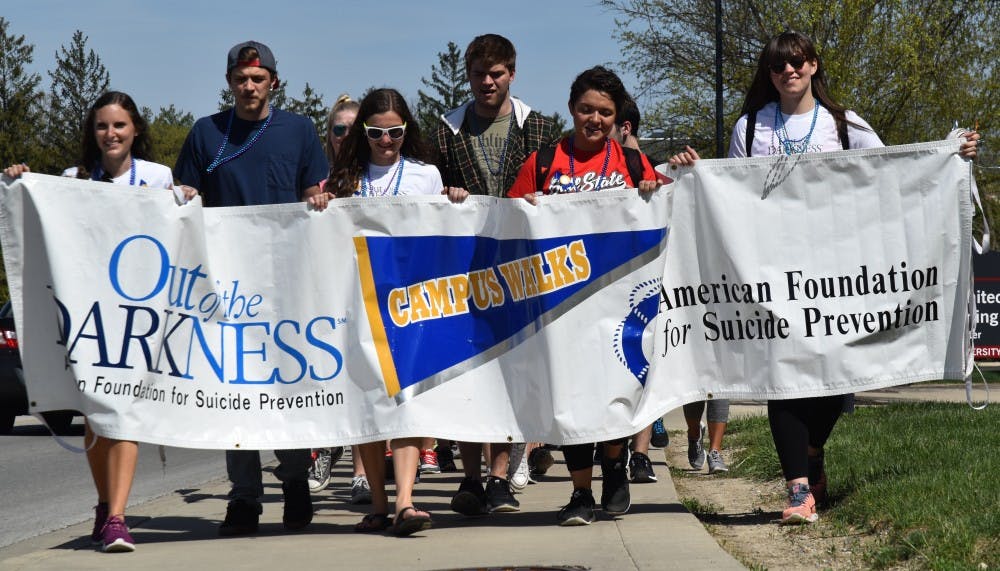If you are a student at Ball State and have issues with suicide or depression, you can make an appointment with the Counseling Center in Lucina Hall Room 320 at 765-285-1736. Students can also call the National Suicide Prevention Lifeline at 1-800-273-8255.
Students who can also join the Alive Campaign on Facebook.
Andrea Hickle first noticed something was wrong when she was hospitalized in fifth grade.
She couldn't keep any food down, she was severely dehydrated and the physical tests didn't give her and her family the answers they needed. After psychiatric tests, the doctors diagnosed her with depression, anxiety and borderline personality disorder.
The senior social work major walked at the American Foundation for Suicide Prevention and the Alive Campaign's walk on campus to spread awareness about suicide and mental health on April 24.
"I personally have never had anyone die from suicide that was close to me, but my family does have a long history of mental illness," Hickle said. "My parents have dealt with [mental illness] before with my sister so I was fortunate to have that intervention."
She hopes the walk can spread awareness and change people's view on suicide and depression.
Suicide is the second leading cause of death in college-aged students and the third leading cause of death in the U.S., according to the Alive Campaign.
"When I was younger and was suicidal I would just say [the feeling] was an indifference which you can't really understand unless you feel it," Hickle said. "I was able to tangibly measure if I was getting better when I started looking forward to things again. When I was really depressed, I didn’t care about anything."
Oftentimes, suicide and depression are invisible to society and aren't always given the attention that many physical diseases get, walk participants said.
Pauline Dearing, a senior elementary and special education major, said suicide and depression tend to be a taboo topic because people don’t understand it.
“I think people sometimes think that suicide is a choice, that 'Oh they can help it' [or] 'They are doing it to themselves,'" Dearing said. "I think people don’t understand that mental illness is a real illness because it has 'mental' in front of it. People don’t think that it’s a thing that can actually be diagnosed."
Annemarie Stockton, president of Alive, a suicide prevention and awareness group, said these types of events can help people who have lost anyone in the past, and is a way for them to honor them and celebrate their life.
"That period was when I was hospitalized for awhile and I was out of school for a couple months cause I was in the hospital." Hickle said. "Today, I’m a self-sufficient adult due to early intervention."
The idea that suicide and depression can be fixed easily and that it's not a physically obvious sickness was on many of the participant's minds.
“I think there is such a stigma with mental illness and everyone thinks, ‘Oh, you’re depressed, you could get over it, you could do whatever, that it's your fault, that’s not a real issue’ when it is a real issue," Stockton said. “It’s a chemical imbalance in your brain — it’s as much as an issue as anything else that’s attacking your body, it’s just very internal, it’s with your brain.”
Maralee Frush, a junior social work major and member of the Alive Campaign, has struggled with suicide herself and has family members who struggle with mental illness and depression.
“Mental illness is something that is uncontrollable, just like physical illness," Frush said. "I think we forget the fact that it is uncontrollable a lot."
Sometimes college students who struggle with suicide or mental illness can have trouble finding the resources to cope or get help.
Brandon Puszkiewicz, a senior social work major and member of the Alive Campaign, said the awareness walks that happen around the country make for a good opportunity to help students find resources and express themselves.
“There are so many college students that really struggle with suicide or mental illness in general and really don’t know what resources are available to them even in their own backyard on their own campus," Puszkiewicz said. "So I feel like something like this is something really important because it give them the outlet to express themselves.”





